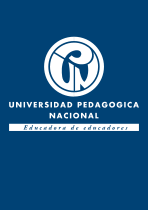Ciencia para no científicos: lo que Einstein desconocía sobre el cambio climático.

Citación
Fecha
2017-05-17Autor
Porras Contreras, Yair Aalexander
Angarita galviz, Ivon Inés
Metadatos
Mostrar el registro completo del ítemResumen
Ante el agravamiento de la crisis ambiental global,la Ciencia y la Tecnología se han convertido en uno de los referentes para la solución de problemáticas tan diversas como la pobreza, la inseguridad alimentaria y el cambio climático, entre otras, por lo que su influencia en la transformación de la sociedad, constituye uno de los retos para la formación ciudadana. Consecuentemente, el estudio de las relaciones Ciencia, Tecnología, Sociedad y Ambiente (CTSA), que pretende examinar la situación del planeta, las desigualdades e inequidades que imperan en el mundo globalizado, con el objeto de empoderar a los ciudadanos en la toma de decisiones, plantea una paradoja en la cual se atribuye a la ciencia y la tecnología, también la responsabilidad de la aparición e incremento de dichas problemática ambientales. Ante esta disyuntiva, el proyecto CIENCIA PARA NO CIENTÍFICOSdesarrollado por el Club de Astronomía y Ciencias “TATAXUE”,conformado por un grupo de docentes y estudiantes del Colegio Distrital Orlando Fals Borda (Bogotá-Colombia), pretende desmitificar el papel de la Ciencia y la Tecnología como los únicos conocimientos válidos y confiables con los cuales las sociedades pueden hacer frente a las amenazas ambientales, lo cual plantea una crítica tanto a la representación social “del alumno como científico” (Marín y Cárdenas, 2011), como al movimiento de “alfabetización científica y tecnológica” (Gil y Vilches, 2005), porconsiderarlos excluyentes y propugnar una representación universalista del conocimiento. Este proyecto ha consolidado la participación de la comunidad educativa hacia el reconocimiento de acciones sustentables con el ambiente y la investigación en el marco de la construcción de múltiples ciudadanías. De igual manera, el proceso metodológico interdisciplinar que se construye al interior del propósito formativo, considera cuatro líneas de investigación 1) Astrobiología, 2) Biofilia 3) ReutilizARTE y 4) Ceres S ́cool, en las cuales se desarrollan estrategias didácticas que permiten conocer las causas y consecuencias del cambio climático, permitiendo adelantar acciones en torno a la adaptación frente a esta problemática global. Los resultados de este trabajo se recogen en un libro electrónico elaborado por el IDEP con asesoría de la Pontificia Universidad Javeriana.
Abstract
Given the aggravation of the global environmental crisis, Science and Technology have become a concerning for the solution of diverse problems such as poverty, food insecurity and climate change, among others, so their influence on the transformation of society, is one of the challenges for citizenship education. Consequently, the study of relationships Science, Technology, Society and Environment (STSE), which aims to examine the situation in the world, inequalities and inequities that prevail in the globalized world, in order to empower citizens in decision-making raises a paradox which is attributed to science and technology, also the responsibility of the emergence and growth of these environmental problems.In view of this dilemma, the project that is called “ Science for no scientists” was developed by the Club of Astronomy and sciences "TATAXUE" made up by a group of Orlando Fals Borda School( Bogotá-Colombia) teachers and students and it aims at demystifying the role of Science and Technology as the only valid and reliable knowledge which societies can cope with environmental threats , which poses a critique of both social representation "of the student as a scientist" (Marin and Cárdenas, 2011), and the movement of "scientific and technological literacy" (Gil and Vilches, 2005), considering and advocating them exclusive and proposing an universalist representation of knowledge. This project has consolidated the educational community participation towards the recognition of sustainable actions and research in the context of the construction of multiple citizenships. Likewise, the interdisciplinary methodological process that is built inside the formative purpose considers four research lines 1) Astrobiology, 2) Biophilia 3) Reuse ART and 4) Ceres S'cool, in which didactic strategies are developed that provide insight the causes and consequences of climate change, allowing further actions regarding the adaptation to this global problem. The results of this work are contained in an electronic book made by IDEP with advice from the Pontificia Universidad Javeriana.
Editorial
Editorial Universidad Pedagógica Nacional
